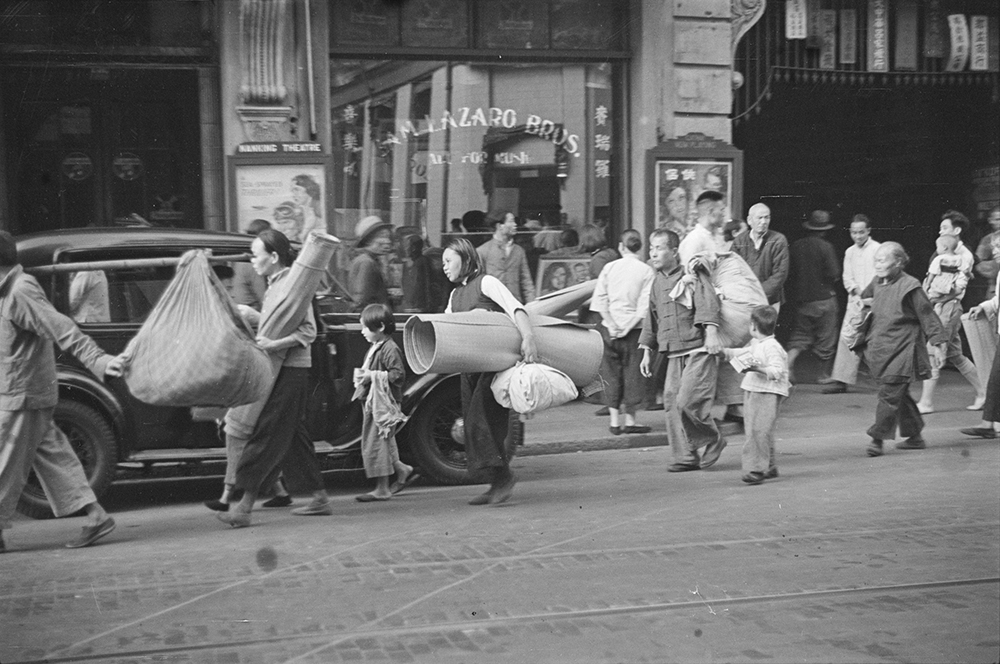Dr Helena F. S. Lopes is a Leverhulme Early Career Research Fellow at the Department of History, University of Bristol
The Portuguese were one of the largest communities in Shanghai from the 1840s until the early 1950s. Although many had a Macanese family background, not all did. An important connection, virtually ignored in the existing literature, links some Portuguese families in China not to Macau or Hong Kong, but to India. This blog post is about one of them.
While working on the edition of a 1937 report written by the Portuguese consul in the city during the battle of Shanghai, a name caught my attention: ‘Joaquim Bernardino de S. Lazaro’, ‘owner of the Sam Lazaro Brothers Firm’ in Shanghai. In the report, Bernardino de Sam Lazaro is mentioned as one of the prominent members of a relief commission set up to assist Portuguese nationals in Shanghai during the Sino-Japanese hostilities. Among other tasks, this volunteer commission played a decisive role in helping evacuate members of the community out of Shanghai. Bernardino de Sam Lazaro’s actions are singled out for praise for having lent a company truck and one of his personal cars to the consulate, used to carry people and their luggage in their flight to safer locations.
Intrigued, I searched for more information and one of the pieces of the puzzle was found right here on the Historical Photographs of China Project website! A photograph by Malcolm Rosholt showing Chinese refugees passing in front of the Sam Lazaro Bros shop window on Nanjing Road, Shanghai’s foremost commercial avenue. Taken by the American journalist, the photograph was contemporaneous to the consul’s report: both are sources by foreign observers of China’s War of Resistance. And in the middle of both, hidden amongst other information, is Sam Lazaro.

Refugees outside Sam Lazaro Bros shop, Shanghai, 1937. Photograph by Malcolm Rosholt. HPC ref: Ro-n0186
A bit more digging helped shed additional light on this company and the family who found it and ran it. Sam Lazaro Bros (賚瑞羅音樂所 Lai Ruiluo yinyuesuo [Lazaro music house]) was set up by three Sam Lazaro Brothers, one of whom was Bernardino, in 1916 or 1924.[1] It imported pianos and other musical instruments and records from North America and Europe. An entry for Sam Lazaro Bros in the 1925 volume of Seaports of the Far East lists the company as ‘Importers of Musical Merchandise, Piano Tuners and Repairers’ at 125 Szechuan (Sichuan) Road. The 1938 Directory and Chronicle for China, Japan, Korea, etc. listed it on 130 Nanjing Road. Other sources locate the company at 232 Nanjing Road (for example, this entry on the website ‘The Pipe Organ in China Project’). I was excited to find that the firm was also connected to cinema. Seemingly, it was a ticket agent for major film theatres in Shanghai like the Cathay or the Nanking. Indeed, two film posters can be seen outside the shop in Rosholt’s photograph.

An advertisement for the screening of George Cukor’s film Holiday (1938) at the Nanking Theatre, with the information (at the bottom) ‘Downtown Booking at Sam Lazaro Bros’, published in The China Press, 15 October 1938. Several film listings published in the Shanghai press in the 1920s and 1930s had similar references to the firm.
According to information in Chinese cited in the entry about the company in MADSpace, Sam Lazaro Bros also had branches in Panaji (Pangim), Goa’s capital (then under Portuguese rule) and Yangon (Rangoon, then under British rule), which illustrates how the company’s owners – like other families in Asia – straddled the British and the Portuguese imperial worlds, not simply in East Asia but also in South and Southeast Asia. I later came across archival files from 1949 and 1951 on some members of the Sam Lazaro family, confirming their registration at the Shanghai consulate as Portuguese, possibly from when they were preparing to leave the city. Bernardino is listed as having been born in ‘Margão, Portuguese India’ in 1888.
A genealogy website lists Joaquim Bernardino de Sam Lazaro as having died in Shanghai in 1972, an intriguing information as the great majority of Portuguese nationals had left Shanghai by the early 1950s. Could he have been one of the few foreigners to remain in the People’s Republic of China? Possibly not, as another ancestry website states that he passed away in Bangalore, India. A brief mention in this article also notes that the family left Shanghai for Bangalore in 1951 and that, later, some members went to the United States (one of Bernardino’s sons, Fred de Sam Lazaro, is a distinguished journalist). The same article mentions Bernardino’s wife was a physician and there’s a brief February 1941 report in the North China Herald on Bernardino’s marriage to ‘Dr. Alda da Silva’ at the (Catholic) Church of Christ the King. Did Dr Silva practice medicine in Shanghai? I haven’t yet found an answer to this.
In sum, a name in a report and a photograph on HPC opened a window into a history of global migration involving China, India, Burma, Britain (through the British Empire), Portugal, and the US. They are also linked to a history of global circulation of commodities such as musical instruments and of the distribution of Hollywood films in China, mediated by companies like Sam Lazaro Bros, that were both local and transnational.
*
[1] The entry about the company in Dr Cécile Armand’s MADSpace platform gives a founding date of 1916 whilst Dr Szu-Wei Chen’s ‘The Music Industry and Popular Song in 1930s and 1940s Shanghai: A Historical and Stylistic Analysis’ (PhD thesis, University of Stirling, 2007) states it was set up in 1924 (p. 137).
